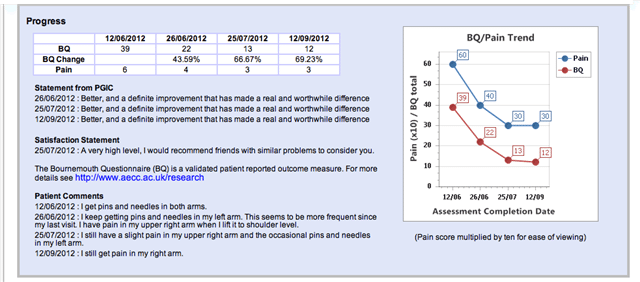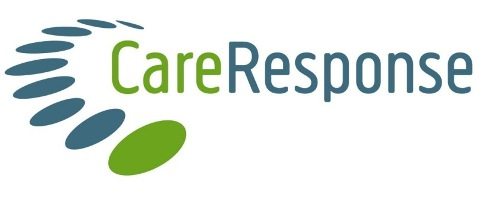Overview
Practices have a choice of validated patient reported outcome measures (PROMs) including; Patients Global Impression of Change (PGIC), Bournemouth Questionnaire (BQ) and the Measure Yourself Medical Outcome Profile (MYMOP). The PGIC and BQ are recommended as the outcome tools of choice for those providing musculoskeletal services (MSK) to the NHS under Any Qualified Provider contracts. Patient satisfaction is assessed with a brief global impression of satisfaction questionnaire providing an overview, and a more comprehensive multi domain satisfaction questionnaire (CPAQ or PTAQ) giving a more detailed report.
Care Response runs on a database accessed via any internet browser. This has advantages in that there is no program to install, it works on any device capable of accessing the internet (including smart phones and iPads) and producing upgrades and maintaining the software is easy.
When a patient completes a PROM, results are delivered to their practitioner by email. These are anonymous, containing only a file and system number reference for reasons of security. Logging into Care Response allows practitioners and see detailed information for their patients.
Practitioners using Care Response may view graphs containing collated results from all of their patients. They may also compare these to results for all practitioners at their practice or all practices using the Care Response system.
Outcome forms are routinely sent to patients by email 14, 30 and 90 days after starting care. These times are felt to be useful in providing information during care as well as assessing how well any benefits last up to three months on. During care a practitioner may add extra assessments for a patient whenever they feel appropriate; such as at a formal review or discharge.
The initial assessment competed by patients includes a brief background medical history, and for those with lower back pain, the STarT Back screening questionnaire (SBT). A summary is provided for their practitioner. This includes calculation of the SBT ranking of the patient’s risk of having disabling pain in three months.
Care Response produces a ‘to do list’ of GP letters due, and can create draft letters which may be edited in word processors or clinic management software.
Great effort has been made towards maintaining the data collected. Care Response uses most secure encryption commercially available for transmitted data, and gives users only access to information that relates to their own organisation. Data is held on an industrial quality storage facility with regular back ups so it should never be lost.
With the explicit consent of those to whom the data relates information collected is being used for academic and research purposes. Publications to date include papers in Spine, Chiropractic and Manual Therapy and Clinical Chiropractic.

